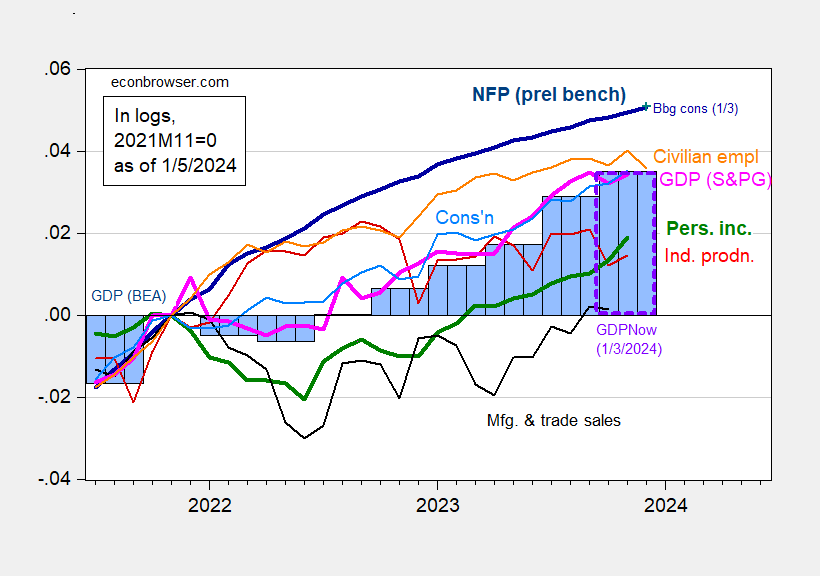NFP growth surprises on the upside (see discussion here), but combined with downward revisions in October and November, we’re just at about the consensus level. Here’s the picture of some key indicators followed by the NBER Business Cycle Dating Committee, plus monthly GDP and GDPNow.
Figure 1: Nonfarm Payroll employment incorporating preliminary benchmark (bold dark blue), implied level using Bloomberg consensus as of 1/3 (blue +), civilian employment (orange), industrial production (red), personal income excluding transfers in Ch.2017$ (bold green), manufacturing and trade sales in Ch.2017$ (black), consumption in Ch.2017$ (light blue), and monthly GDP in Ch.2017$ (pink), GDP, 2nd release (blue bars), and GDPNow for 2023Q4 as of 1/3 (lilac box), all log normalized to 2021M11=0. Source: BLS via FRED, BLS preliminary benchmark, Federal Reserve, BEA 2023Q3 2nd release incorporating comprehensive revisions, S&P Global/IHS Markit (nee Macroeconomic Advisers, IHS Markit) (1/3/2024 release), Atlanta Fed, and author’s calculations.
Bloomberg consensus is for +163K NFP growth on 1/3, and +170 just before the release. Actual was +216.
While civilian employment went down 0.4% m/m (5.1% annualized), it’s important to realize that in tracking the business cycle, the household survey measure provides almost no information. Now there is some casual evidence that downturns in the household survey measure precede those in the establishment survey measure. In the last 4 recessions, the household series has preceded the establishment series twice using real time data (the other two times, they declined at the same time). On the other hand, using the household measure as an indicator, we would’ve said a recession was coming in May, and in October, of 2023.
Today’s NY Fed nowcast for Q4 is 2.54% q/q AR (compared with 2.5% for GDPNow of 1/3). St. Louis Fed News index at 1.78%.

I’m starting to, now, just begnnning here….just maybe thinking, Menzie feels the “household survey” is near useless, I don’t know, I’m pretty “slow on the take” sometimes.
What I like about Menzie, is, he’s very sharp, but he presents things in a way people of different intelligence levels can “take in” and it is MUCH to Menzie’s credit.
As a teacher I mean,
I don’t like the word “professor” though I am sure my father loved that word. “Teacher” to me means we’re talking to each other, “Professor” means you’re talking “down” to me, from a podium, And you better G*damned believe I took that into account in my 7 years of “teaching” in China. I thought about it every day, Did it take??? I don’t know, I made made the EFFORT,
I was incredibly sensitive, to the idea, of the “ugly American” or “the arrogant foreigner” while I was in China, Super-sensitive to that. But in my latter years in China I felt I failed. Not with my GF, but with my students.
You know, the “ugly American” in “The Ugly American” was an engineer who had a closer relationship with locals than did U.S. diplomats in the same country. He was actually the good guy, in part because he wasn’t “pretty”, sitting in a nice, clean office where no good could be done and nothing could be learned.
The Peace Corp was in part the result of that book. I would venture a guess that the Foreign Service Act of 1980 was also partly a response to tha book. The Act aimed at ending the monopoly of elite university grads and blue blood in the Foreign Service.
Being among the people meant being ugly. Be ugly, my friend.
Pardon the off-topic commsnt, but prior to the 2022 mid-term election, members of the comments-section troll choir tried hard to sell the notion that the U.S. was in recession. We are again in an election year, so perhaps we have that to look forward to again.
But maybe not. As I understand this business of political hackery, the goal is to exploit existing concerns; resuscitating old concerns is expensive and uncertain. So what can we look forward to, based on exploitable concerns?
Recent polling finds that:
“Overall, 69% of voters…said they believe Biden was legitimately elected. Sixty-three percent of all voters…said there is no concrete proof of election fraud.”
“Fifty-five percent of voters said the Jan. 6 Capitol riot was an attack on democracy that should never be forgotten, while 43% said too much has been made of it…”
“Fifty-six percent of voters said they believe Trump will definitely or probably be found guilty of criminal charges related to his efforts to overturn the 2020 president election, while a third said he was innocent.”
https://ny1.com/nyc/all-boroughs/politics/2024/01/02/poll-on-third-anniversary-of-jan–6-attack
Not good news for Trump.
Recent polling also finds that:
“A majority of Americans disapprove of the way Biden has handled five different policy area… Specifically, just over 2 in 3 disapprove of the president’s performance on immigration (69%) and inflation (68%), while more than half feel the same about the way he has handled climate change (54%), jobs and unemployment (53%), and transportation and energy infrastructure (52%).
https://www.monmouth.edu/polling-institute/reports/monmouthpoll_us_121823/
Not good news for Biden.
Abortion is an odd issue, so far as politics goes, and clearly a powerful one. Polls find that
“…47% of U.S adults favoring expansive abortion rights (legal in all or most cases) and 49% favoring more restrictive rights (legal in only a few or no cases).”
https://news.gallup.com/poll/321143/americans-stand-abortion.aspx
However:
“Every statewide ballot question about reproductive rights since 2022 – seven in all – has yielded victory for abortion rights advocates, including in conservative states such as Ohio, Kansas and Kentucky.”
https://www.reuters.com/world/us/how-abortion-could-impact-2024-us-elections-2023-12-14/
A critical question for election results is how these issues play in swing states. I have nothing on that now, but the year has just begun.